The Belgic Confession of Faith: Article 35
The Belgic Confession of Faith: Article 35
We have now come to the second sacrament. Previously we considered holy baptism, the sacrament which has come in the place of circumcision. There is a difference between the two sacraments. Baptism is administered but once and is the sacrament of birth, or incorporation into the church, into the body of Christ. The Lord's Supper is to be administered many times, because it is a sacrament of nourishment and preservation. We are all born but once, but we need continual nourishment of our body in order to exist and to continue to exist. Therefore the Lord's Supper also, as so beautifully explained in this article, is for the nourishment of spiritual life.
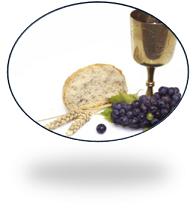 "The Lord's Supper" is just one of the names which has been given to this holy sacrament. Sometimes it is also called "the breaking of bread," as in Acts 2:46: And they continued "daily with one accord in the temple, and breaking bread from house to house." That was the Lord's Supper. Sometimes it has also been called "the cup of blessing" when we read, "The cup of blessing which we bless, is it not the communion of the blood of Christ?" Also it is said to be "the communion of the body and blood of Christ" in 1 Corinthians 11:27, "Whosoever shall eat this bread, and drink this cup of the Lord, unworthily, shall be guilty of the body and blood of the Lord." That speaks of the defiling of the Lord's Supper. It is also called "the table of the Lord." In 1 Corinthians 10:21 we read, "Ye cannot drink the cup of the Lord, and the cup of devils: ye cannot be partakers of the Lord's table, and the table of devils." This is again in reference to the Lord's Supper.
"The Lord's Supper" is just one of the names which has been given to this holy sacrament. Sometimes it is also called "the breaking of bread," as in Acts 2:46: And they continued "daily with one accord in the temple, and breaking bread from house to house." That was the Lord's Supper. Sometimes it has also been called "the cup of blessing" when we read, "The cup of blessing which we bless, is it not the communion of the blood of Christ?" Also it is said to be "the communion of the body and blood of Christ" in 1 Corinthians 11:27, "Whosoever shall eat this bread, and drink this cup of the Lord, unworthily, shall be guilty of the body and blood of the Lord." That speaks of the defiling of the Lord's Supper. It is also called "the table of the Lord." In 1 Corinthians 10:21 we read, "Ye cannot drink the cup of the Lord, and the cup of devils: ye cannot be partakers of the Lord's table, and the table of devils." This is again in reference to the Lord's Supper.
It is called a "supper" because it was instituted in the evening, before Christ was delivered up into the hands of others, the night before His last and heavy suffering on the cross.
The Lord's Supper is an institution of Christ Himself. We read that He instituted and distributed it. We see four steps: Christ took the bread, He blessed it and blessed the cup, He broke the bread, and He gave it. Here we see a beautiful picture of the mediatorial work of Christ and its fruits. Christ was qualified for His mediatorial work by taking upon Him the human nature and by being anointed with the Holy Spirit without measure. He took the bread, as He took upon Him the form of a servant, and He blessed it, that it might be qualified, as it were, to feed and to nourish the believers, for without His blessing nothing will profit. Then He broke it, which signifies that Christ has broken His body and shed His blood on the cross, that He gave Himself and His perfect self-sacrifice so that He may become the bread of life and the water of life to hungry and thirsty souls. Not only did He break it, but He also gave it, which signifies that He is also the One who distributes and by His Spirit applies His benefits to those who are partakers of Him and His benefits by faith. The work of God is always first: He took; He blessed; He broke; He gave; and they may receive it by grace.
In the Lord's Supper the Lord has given two signs, bread and wine. These signs signify the body and blood of Christ. These signs are very suitable to teach us, to signify, in the visible gospel, that Christ gave Himself into death for His church.
Bread is a suitable sign when we look at the origin of bread, which is in the earth. There the corn of wheat fell, there it died, and there it began to spring up. And so it is with the origin of the human nature of Christ. He assumed it not from heaven, but from the virgin Mary. He came on earth to assume His human nature. He also was the corn of wheat which would fall into the earth, die, and then bring forth much fruit.
Bread is also a very suitable sign when we compare the process which it takes for the corn of wheat to become bread upon the table. First the ear of corn is cut off, is collected, is harvested. Then there is a long process before the bread is ready as the final product. There is the process of grinding, of bruising, of baking.
Christ is the Bread of Life. He is the One who has been bruised under the millstones of the wrath of God; He is the One who has been put into the fiery furnace of the indivisible wrath of God because of the sins of His people.
That sign of bread is also suitable when we consider that bread is a necessary food. It is essential to our well-being. Christ says in John 6:53, "Except ye eat the flesh of the Son of man, and drink His blood, ye have no life in you." Outside of Christ there is no life, and there is a church which learns to know: "Give me Jesus, else I die." They are not satisfied with knowing that there is bread, or with talking about the bread, but they must eat it and they must drink the blood; it must be part of them, and they must be partaker of it. How necessary is Christ for the soul! Outside of Him there is no life; and the life which the Lord has wrought cannot be preserved outside of Him.
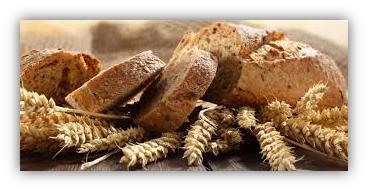 Bread is also delicious; it tastes good to the hungry soul. We read in the Song of Solomon that the bride says about the Bridegroom, Christ, "I sat down under His shadow," under the apple tree, "with great delight." If it is well, then Christ is also an object of great delight when something may be tasted of His nearness and we may sit down under His shadow. How long ago was it that we sat under His shadow with great delight?
Bread is also delicious; it tastes good to the hungry soul. We read in the Song of Solomon that the bride says about the Bridegroom, Christ, "I sat down under His shadow," under the apple tree, "with great delight." If it is well, then Christ is also an object of great delight when something may be tasted of His nearness and we may sit down under His shadow. How long ago was it that we sat under His shadow with great delight?
Bread is also the sign of something very precious. How many people have to do without it, and are doing without it! How precious would one loaf of bread be to them! We read of Christ in 1 Peter 2:7, "Unto you therefore which believe He is precious."
Bread also strengthens. What do we read of the Lord Jesus? "He restoreth my soul: He leadeth me in the paths of righteousness for His Name's sake."
We could say more about the bread, but these examples show how suitable this sign is.
Wine is also a visible sign of Christ, the sign of His blood. Wine is obtained and prepared by pressing in the winepress. We read of Christ that He was pressed in the press of God's wrath. He says in Luke 12:50, "But I have a baptism to be baptized with." He was in great straits. He was under the pressure of the heavy hand of God. How He was pressed in Gethsemane, when His sweat became as great drops of blood; and on the cross, when He cried out in the darkness on Golgotha, "My God, My God, why hast Thou forsaken Me?"
Wine quenches thirst. So Christ said of Himself, "Whosoever drinketh of the water that I shall give him, shall never thirst."
Wine also rejoices the heart. We read in Isaiah 61:10, "I will greatly rejoice in the Lord." Wine makes the dumb to speak. Often wine will cause one to speak foolishness, to speak too freely. But Christ makes us speak words of wisdom. We read, "How great is His goodness." When He gives a taste of something of Himself, it makes the dumb to speak freely.
Wine also has a refreshing and healing power. We read of Christ in Malachi 4:2, "The Sun of righteousness shall arise with healing in His wings."
When in the Lord's Supper the table is prepared and the bread is taken, it signifies how Christ has been set apart. As this bread has been set apart for this holy table, so Christ has been set apart from eternity for the church of God.
Rome teaches the error of transubstantiation. This means that the substance of bread and wine changes into another substance, that is, the bread and wine literally change into the body and blood of the Lord Jesus Christ. The priest then has the body of Christ in his hands; when he drinks the wine, he drinks the blood of Christ with his physical, bodily mouth.
Together with transubstantiation they teach the popish mass, which has the idea of a sacrifice. At the moment the priest breaks that little piece of bread, the body of Christ is sacrificed again. According to Rome, it is pleasing to God that this sacrifice is repeated, because it shows our dependency on that sacrifice. However, this error shows something else: that man always wants to put his fingers into the perfect work of Christ.
It is not the sinner and it is not the believer who goes with Christ to God, who goes with that sacrifice to the Father; it is Christ who goes with the church to His Father. It is Christ who sacrificed Himself, and with one sacrifice He perfected forever all those who are sanctified, all those who are given unto Him. It was by one sacrifice. You may read this in the epistle to the Hebrews.
Luther, who in the beginning of his theological career was not very clear on this subject and wavered somewhat, might have come closer to the opinion of Zwingli or Calvin, had there not been a professor in Wittenberg, Carlstadt, who was a bit extreme. Carlstadt saw so much of the Roman Catholic error concerning the bodily presence of Christ in the Lord's Supper that he went to the other extreme and completely denied Christ's presence in the Lord's Supper. Carlstadt claimed that the Lord gave this sacrament only that believers might confess Him again, show their obedience in commemorating His death, and show their love to Him and to each other. Thus, according to Carlstadt, Christ is not present in the Lord's Supper.
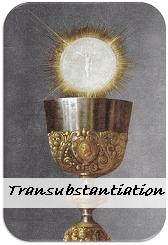 When Luther was confronted with that error, he was again confirmed in his idea that Christ is truly present in the Lord's Supper. However, Luther thought Christ was physically present with body and blood. No, he did not teach that bread and wine changed into the body and blood of Christ, as Rome did, but he said that the body and blood of Christ are present in, with, or under the signs of bread and wine. Bread and wine remain bread and wine; they do not change into the body and blood of Christ.
When Luther was confronted with that error, he was again confirmed in his idea that Christ is truly present in the Lord's Supper. However, Luther thought Christ was physically present with body and blood. No, he did not teach that bread and wine changed into the body and blood of Christ, as Rome did, but he said that the body and blood of Christ are present in, with, or under the signs of bread and wine. Bread and wine remain bread and wine; they do not change into the body and blood of Christ.
Luther also taught the omnipresence of the human nature of Christ. He believed that at the ascension of Christ some divine qualities were given to His human nature. So then Christ's human nature could be everywhere on earth – omnipresent. According to Luther, the human nature was literally, physically present in, with, or under the signs of bread and wine. We call this the doctrine of consubstantiation.
Luther explained the words, "This is My body," as "This contains My body. It is not My body, but it contains it." He said that although we cannot explain it, it is a matter of faith, just as there are so many other things we cannot explain. He used as examples that we cannot explain the Trinity and cannot explain many points of our doctrine. We must believe them, but then they must also be based on Scripture.
Zwingli, the Swiss reformer, came close to the opinion of Carlstadt and of the Anabaptists. He did not believe that Christ would be really present with, in, or under the tokens of bread and wine. He said, "The Lord's Supper is a public confession of the believer." And it surely is. When the Lord's Supper is held, God's children do make a public confession. When they are asked the question, "Who is your Beloved?" they say, "My Beloved is white and ruddy, the chiefest among ten thousand." When the Lord asks, "Will ye also go away?" they confess, "To whom shall we go? Thou hast the words of eternal life." They confess that He is the only One who can save them, He is the only One in whom they trust. It may be with a weak trust, often assaulted by the devil, but there is something in them that says that there is no other way for me, no other hope, no other blood, and no other sacrifice.
Zwingli also said that there is an eating and drinking of Christ indeed, but that eating and drinking does not mean that He is present there. It means believing in His name and trusting in His death. That is all. There is no spiritual presence of Christ in the sacrament. In the sacrament we only commemorate the suffering and death of Christ for His people. Zwingli would say that "This is My body" means "This signifies My body." For example, when Christ said, "I am the door," He is not literally a door, but the door signifies who He is. When Scripture teaches that "He is the Rock," the rock signifies who He is. So also he interpreted the words, "This is My body," as "It signifies My body." Indeed, Zwingli was right in this explanation, but yet, in attempting to avoid the Roman Catholic and Lutheran errors, he also was mistaken when he denied there is an eating and drinking of Christ in the Lord's Supper.
In this article of our Confession of Faith we find the teaching of the great Reformer Calvin when it says, "In the meantime we err not when we say that what is eaten and drunk by us is the proper and natural body and the proper blood of Christ." According to Calvin there is indeed a literal eating and drinking of Christ's body and blood. He said, "There is indeed the presence of Christ. As He gave Himself on the cross in His body and blood, so He is again present, but that partaking of the same is not by the mouth as Luther and Rome taught, but by the Spirit through faith." Yet we find strong language here, as it says, "the proper and natural body and the proper blood of Christ" are eaten and drunk by us. And how? It is "by the Spirit through faith." Christ said, "My flesh is meat indeed; and My blood is drink indeed." It is a spiritual meal, Calvin taught. "Christ is present there, essentially, spiritually, and not just in your thoughts, but He is there in the midst of them. And when there may be an eating with the mouth of faith, then there is a real nourishment, a strengthening of the faith of the life of the children of God."
I would say it this way: Calvin wrestled how to explain this mystery in words. He did not want to fall into the errors of Rome and Luther, but he also did not agree with Zwingli, who spoke only of a meal of commemoration of Christ's death and a remembrance of Him. Calvin believed that there is an eating and a drinking of Christ's body and blood, but with the mouth of faith, spiritually. He said, "That is by virtue of the mystical union between Christ and His church, the mystical union between the believer and the Head of the church." He emphasized that unity so strongly that he indeed used expressions as those just quoted, and as found in our Confession.
Another question which might be asked is, "Where must the Lord's Supper be administered?" It must always be in the public worship services, not privately, not in a home. There have been churches in homes; only think of the first Christian churches. They went from home to home, but these were official worship services. The Word of God is preached in the gathering of the congregation, and that is the place where the Lord's Supper should be administered.
For whom has the Lord's Supper been instituted? We know that it is the bread of the children. It is not intended for everyone. We must be a child by the new birth. I would like to mention three main marks of that life which we should have.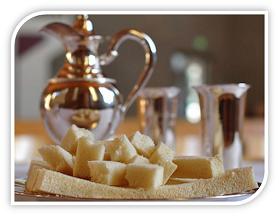
- There should be the knowledge of sin, the loathing of ourselves, and true humbling of ourselves before God. There should be something in our lives of which we read in Psalm 51:3, "I acknowledge my transgressions: and my sin is ever before me." Or what we read in Ezekiel 7:16, "And shall be on the mountains like doves of the valleys, all of them mourning, every one for his iniquity."
- There should be saving faith in the promises of God that all our sins are forgiven. This does not mean having an assured faith that our sins are forgiven, but there must be faith in the sure promises. If it is well, God's children should long for assurance and strive for it and be diligent to make their calling and election sure, but here is meant faith in the sure and the certain promises of God. In other words, it is faith in the gospel, in that Word of God that in Christ there is forgiveness, in Him there is cleansing blood, in Him there is power to cleanse me from all my iniquities, in Him there is access to God. Oh, that faith, that saving faith, finds no grounds in itself, in our own works. It casts itself naked, unworthy, helpless, and wretched upon that only Rock and says, "Lord, if Thou wilt, Thou canst make me clean." That is that necessary refuge-taking faith. We read in John 3:36, "He that believeth on the Son hath everlasting life." That faith should be there. It may be a weak, a small faith, but it should be that faith which is working by love and which binds us to Him, saying, "I will not let Thee go, except Thou bless me."
- There should be true gratitude for that work of Christ. "I will offer to Thee the sacrifice of thanksgiving, and will call upon the name of the Lord." True thanksgiving, gratitude, is evident in a praying life. The main part of gratitude is a praying life. That is a life acknowledging Him in everything. Gratitude will also be evident in a tender walk, a walk in love and unity. We read in Ephesians 5:2, "And walk in love as Christ also hath loved us."
Finally, in what manner should the Lord's Supper be partaken of? I refer again to Arnoldus Rotterdam, one of our old writers.
- With holy respect. Something should be in our heart of what we read in Genesis 28:17, "How dreadful is this place! this is none other but the house of God, and this is the gate of heaven." That is not a running to the table carelessly or triumphantly, as happens when we lose the sense of "how dreadful is this place." The LORD once spoke to His servant Moses, "Put off thy shoes from off thy feet, for the place where-on thou standest is holy ground."
- With an attentive meditation, meditating upon what this Lord's Supper means. "To see Thy power and Thy glory, so as I have seen Thee in the sanctuary."
- There should be a believing heart. There should be something of the longing to eat and drink of that spiritual meat and drink. "Eat, O friends; drink, yea, drink abundantly, O beloved" (Song of Solomon 5:1).
- A hearty love and desire for true godliness, for the practice of it. "I have sworn, and I will perform it, that I will keep Thy righteous judgments."
After partaking of the Lord's Supper: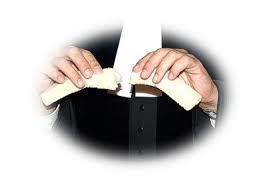
- The heart should be filled with gratitude. "What shall I render unto the Lord for all His benefits to me?"
- There should be fervent love to God and our neighbor. "For the love of Christ constraineth us."
- Also a heartfelt longing, with prayer and supplication for that perfect supper in heaven, of which we read in Revelation 19:9: "And He saith unto me, Write, Blessed are they which are called unto the marriage supper of the Lamb. And He saith unto me, these are the true sayings of God." AMEN.
Then longing souls will be satisfied with the fatness of His house, and God will receive all the honor and glory for what He has done for them.

Add new comment